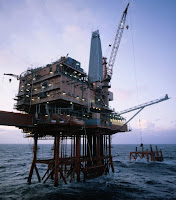 China’s CNOOC has made yet another Canadian acquisition; only its latest one announced earlier this week has global implications in the shape of Nexen. On July 23rd Nexen’s board approved CNOOC’s offer to pay US$27.50 per share valuing their company at US$15.1 billion; a near 60% appreciation on valuation at the close of trading on July 20th.
China’s CNOOC has made yet another Canadian acquisition; only its latest one announced earlier this week has global implications in the shape of Nexen. On July 23rd Nexen’s board approved CNOOC’s offer to pay US$27.50 per share valuing their company at US$15.1 billion; a near 60% appreciation on valuation at the close of trading on July 20th.
So why does this acquisition matter? After all, it isn’t the first time the Chinese state-owned firm has acquired a Canadian asset. Only last November, CNOOC bought Canadian oil sands firm Opti Canada for C$2.1 billion. In 2005, it acquired a 16.7% share of MEG Energy, another Canadian oil firm.
A CNOOC communiqué suggests it is operating as any oil company would, i.e. by strategically expanding its reserve base. It says the acquisition, which is yet to be cleared by the Canadian government, would boost its oil reserves by 30%.
In a rather 'crude' world, if this Chinese takeover is approved by the Canadians, CNOOC would take control of the UK's largest producing oil field - Buzzard. This would be on top of the Golden Eagle prospection zone about 43 miles offshore from Aberdeen. Unlike oil sands upstarts, Nexen is a major established global operator and has a significant presence in the North Sea.
Now if you count Sinopec 49% stake in Talisman's business in the British sector of the North Sea together with hypothetical CNOOC access via a takeover of Nexen; it would in theory give the Chinese control of just under 10% of British oil and gas production in the North Sea!
Understandably, there have been murmurings in the Oilholic’s part of the world. However, there are no loud noises as they would run contrary to the British government’s pro-investment stance and in any case they can’t do much about it. By law, the Canadians can block any foreign investments in the country’s firms exceeding C$330 million if the government believes they are not in Canada's best interests. In 2010, the Canadian government prevented BHP Billiton's US$39 billion hostile takeover of fertiliser firm Potash Corp. The LSE-TSX shenanigans of last year are also well documented.
Chinese firms have not felt as welcome in the US, but in Canada their investment is not considered a taboo subject. So how the Harper government responds in this case, which has far reaching implications beyond Canada, remains to be seen.
Meanwhile, contrary to AAR and tycoon Mikhail Fridman’s assertion that there were no takers for BP’s stake in Russia’s TNK-BP, Russian state giant Rosneft has said it is considering buying the stake. A Roseneft statement earlier this week suggested it was interested in a ‘potential acquisition’.
 TNK-BP is jointly owned by AAR and BP. Already troubled relations between the two became further fraught after BP sought to form a separate partnership with Rosneft last year.
TNK-BP is jointly owned by AAR and BP. Already troubled relations between the two became further fraught after BP sought to form a separate partnership with Rosneft last year.
As AAR has preferred bidder status, this gives it around 90 days during which BP can talk to – but not sign an agreement with – other parties interested in its stake. BP put up its half of the TNK-BP business up for sale in June. AAR has itself declared an interest in buying BP's share.
Finally, the Oilholic is getting in to the Olympics spirit as well! The Chinese, Russians, Americans, Canadians and athletes of some 200-odd countries are now in London town. The Tower Bridge has got its own fancy Olympics rings (see above) and the Olympic Torch passed from the street in front of this blogger’s humble abode on Thursday (see below)!
 For those wondering how the torch was being kept powered-up in some really wretched British weather – there is a liquid fuel canister located about halfway up the torch connected via tiny pipe to the top. Through it, the fuel travels up before it is released out at the top of the torch where the pressure in it decreases and this converts the liquid into gas ignited by a spark. Despite exhaustive enquiries, no one would reveal the flow rate which is special to each Olympic torch.
For those wondering how the torch was being kept powered-up in some really wretched British weather – there is a liquid fuel canister located about halfway up the torch connected via tiny pipe to the top. Through it, the fuel travels up before it is released out at the top of the torch where the pressure in it decreases and this converts the liquid into gas ignited by a spark. Despite exhaustive enquiries, no one would reveal the flow rate which is special to each Olympic torch.
This has been the case since 1972 and London 2012 is no exception to this rule. Quite a few London 2012 Olympic Torches are up for sale on eBay should any of you wish to get your own now that Olympics opening ceremony is done and the cauldron has been lit in the stadium. That’s all for the moment folks! Keep reading, keep it 'crude'!
© Gaurav Sharma 2012. Photo 1: North Sea oil rig © Shell. Photo 2: Tower Bridge London with Olympic rings. Photo 3: London 2012 Olympic Torch passes through London Borough of Barnet, UK. © Gaurav Sharma 2012.
No comments:
Post a Comment